Round 13 – Saturday July 1st 1978
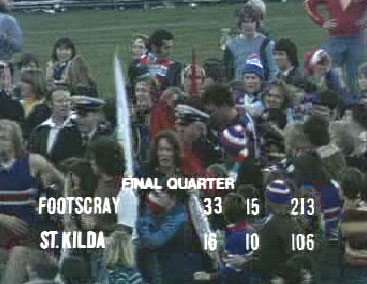
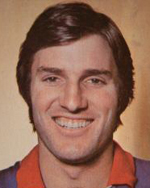 |
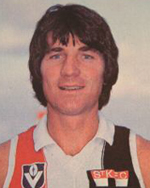 |
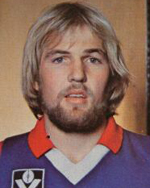 |
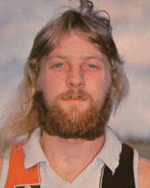 |
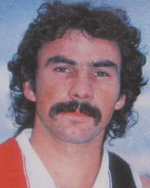 |
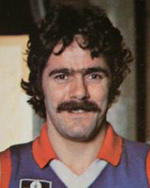 |
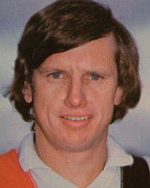 |
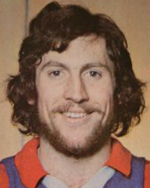 |
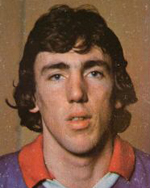 |
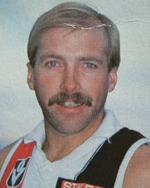 |
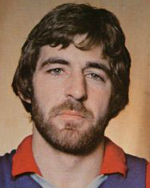 |
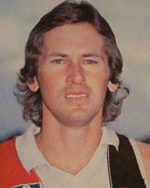 |
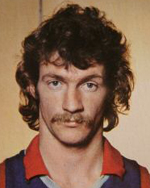 |
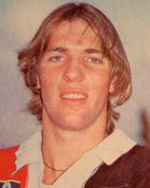 |
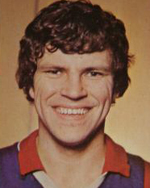 |
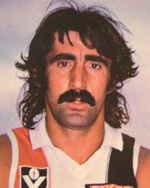 |
There are FOUR definitive achievements that a club can achieve as a team unit in any given game. The four consist of –
(a) Keeping your opposition scoreless
(b) Keeping your opposition goalless
(c) Winning a game by that competitions largest margin
(d) Registering that competition’s highest score
In 1953 Footscray almost kept Fitzroy scoreless. A goal very close to the end of the last quarter by Alan Ruthven prevented Fitzroy from the unwanted distinction of being whitewashed during a game. My father was there and he claimed it broke his heart at the time. So close to a no score were Fitzroy, saved from this hideous tag by their 1950 Brownlow Medal winner’s late effort.
In 1991 Footscray almost kept Carlton goalless for the game. Yet for a free kick paid to Carlton’s Mark Arceri in the dying seconds of which he managed to kick truly, they would have gone through the match goalless. That would have been the first game in over 30 years since Richmond could only muster single figures scoring shots in a match against St Kilda in 1960
The largest winning margin in a game of VFL football is 190 points. Since the competition changed its name to the AFL, that gap has not been increased. This victory by Fitzroy over Melbourne at Waverley in 1979 still stands. as the most resounding victory or defeat depending on your point of view. Our highest winning margin is nowhere near that. It is the rather modest 120 points- an even 20 goals for the defeat of Melbourne at home in 1985. A completely even 20 goals too as we kicked the biblical ‘score’ of goals more than the hapless Demons that July afternoon in 1985. 26.13.169 to 6.13.59 the final score. Funny though but it doesn’t sound right describing a 120 point victory as ‘modest’ but in the context of other teams’ greatest winning score, then 120 points is a low highest ever triumph margin. Five other Victorian clubs have beaten us in heavier hidings than we gave that day in 1985 to Melbourne- three in the one season -1982. That doesn’t need to be discussed here though.
Yet few clubs have held the record for the highest score. Happily one who has is Footscray. It all happened on what was a lucky round 13 for us and an unlucky round 13 for St Kilda on the first day of July 1978.
I was just some weeks shy of turning nine years of age on that afternoon. Yet I was well aware before that day that the record score was 210 points. In full it was 30.30.210 registered by Carlton over Hawthorn at Princes Park in 1969. I had read that in Jack Pollard’s Encyclopaedia of Australian Sport. That book was one of the first books I had read.
I knew all about 1954- family folklore, but at that point did not know that were runners up in 1961 as no family or family friends ever mentioned it.
I perused through the Aussie Rules chapter- each club had a mention and I learned plenty from the New South Welshman Jack Pollard. The highest attendance for a Footscray home game was 42,354 set in 1955. North Melbourne’s highest attendance at Arden Street was 35,000. Victoria Park’s record crowd was in 1947 against South Melbourne. When reading the South Australian Chapter, Woodville’s record attendance was 8,000 one of their club honours was held by Ray Huppatz. This book came out sometime in 1973 the author Jack Pollard was lambasting the newly inroduced tie breaker system introduced into tennis.
As the last quarter of Round 13 Saturday 1st July 1978 progressed the goals kept coming. I had seen Kelvin Templeton kick 9 at the previous home game against Carlton on the Queens Birthday Monday Public Holiday split round. I was there a year earlier in 1977 when he dobbed 9 against Geelong also at home. In 1978 there were very few split rounds unlike now where every round is played over different days. The public holiday we enjoy for Betty Mountbatten’s birthday (well in reality the reigning monarch- Princess Margaret’s sister has her real birthday on April 21 and has since 1926) was one of them. Easter Monday’s and maybe Anzac Day, being the only other possible days for a non-Saturday game. I was willing Templeton to kick 10 and was thrilled when he got to that milestone. Then as more goals were kicked I began to realise that the 210 highest score was an attainable reality. I began exhorting everyone nearby that we had to beat 210. The ‘nearby’ was the standing room in front of the John Gent Stand. In 1980 that standing room in front of the John Gent Stand was gone- it had been replaced by seats for those who had paid to sit where a season earlier we all stood. The atmosphere I believe sadly decreased at the Western Oval from 1980 due to this seat incursion into the standing area- but that doesn’t need to be discussed in this chapter.
When Kelvin Templeton put away his 6th for the quarter and 14th overall, we were only three points shy of the 210. There wouldn’t be enough time for four separate behinds to be notched it had to be done by another goal. Now I was frantic, this was a great opportunity to create history it just had to be grasped. There wasn’t much time. The fine clubman and Footscray stalwart Steve Power had the ball on the outer wing and drove it forward. Kelvin Templeton rose and got both his hands to the ball without appearing to completely control it. Field umpire Tony Bryant though paid him the mark much to the obvious pleasure of his team mate Jack Di Natale who was nearby. The crowd then invades the field but this time the incursion had momentum compared to the sporadic smaller earlier efforts by individuals. After some time a path is created for this the fateful kick and it sails through and many of those pitch invaders that had ran off the field return to it.
It wasn’t the final kick of the game, St Kilda head for their change rooms and then they return for another final minute. Indeed there was definitely an opportunity for another Footscray goal and it would have been the sweet 16th for Kelvin Templeton, but it was only to be 15 as St Kilda managed to clear it from danger and force it towards their end. The siren sounds with Ross Abbey about to get into some argy bargy with his St Kilda opponent, yet the siren prevents this confrontation and it is handshakes between Abbey and Elliott.
Geoff Leek and Peter Booth “are the commentators and some of their quotes and one-liners from the last quarter are quite memorable. Geoff Leek sadly died early in 2008. “Anyone who can kick 10 goals today is a genius” announces the gentle giant Geoff Leek.” “It has been a holocaust for St Kilda (though ‘Smooth’ makes it sound like ‘holly cost’).
Yet all good things come to an end. This definitely applies to Footscray supporters, perhaps more than any other- in particular those too young for the 1954 triumph and even more so for those who have no recollection of 1961. This increases for anyone who was too young for the 1970 Night Grand Final victory. For Footscray people born from say 1965 onwards- the record score game of 1978 is the great triumph. It was our day in the sun- Footscray yes us now holding this marvellous honour but it wasn’t to be for very long. A loss at the Western Oval to Geelong just over a year later was bad enough but that day was ruined further and irreparably when the news came through that the Lions rampant performance over Melbourne had apparently also involved going beyond scoring 213. We had heard this at the game and it was an agonising walk from the ground down Barkly Street, past the TAB (which is no longer there) to where we were parked in Wolverhampton Street just around the corner from this TAB that my old man frequented at every home game. Driving home the dreaded news was confirmed, out record was gone. Carlton held it from 1969-1978, Fitzroy were to hold it from 1979-1992. Geelong the present incumbents have held it since 1992. Last year it looked threatened, but Cat fans weren’t worried if the 1992 Geelong score of 239 was eclipsed because it was they themselves who would break their own record, against Richmond at the Docklands, but they just didn’t quite get there. So we at Footscray were to hold it for just over 1 year.
All Footscray fans in their late 30’s have never seen a Premiership, never been to a Grand Final that their Bulldogs have played in- That is for both day Grand Finals (the real McCoy as the 1883-1883 Bulldog Book mentions at the end) and the lesser but still important night Premiership. No Footscray fan has on any arm, tattoos which say ‘left arm night premiers right arm day premiers’ or whatever it was that the tattooist in South East Asia decorated in error on the arms of a well refreshed Geelong supporter after their 2007 Grand Final victory. People who work as tattooists would not have done much business with Bulldogs supporters. We bring little income to those in that industry.
Maybe there could be a place for those with a taste for the retrospective that wish to get tattoos of the 4 night triumphs or even the 10 overall Footscray Premierships, though I guess that only 1954 would be done by people who are into colouring their skin with images.
The 1978 record score game has its 30 year anniversary, this year in 2008. Let’s hope it is officially either recognised by the club or if not, then unofficially the 1978ers get together to commemorate it.
Kelvin Templeton has just been made a Life Member and is living out of Australia at present, but he is evidently going to return to Australia sometime during the football season to accept this honour in the flesh. A good time would be in or around the 1st of July 2008- I sincerely hope there is a reunion of the players.
Not all people my age can recall Footscray v St Kilda from Round 13 July 1st 1978. Some will say that they were a bit too young to remember. I fortunately do remember it and thankfully I was in attendance. With no Premierships, No Grand Final appearances and never even finishing the home and away season on top of the ladder- the record score game is the memorable day. Thank goodness I was there- I am eternally grateful for that. Long may its memory stand.
 |
 |
 |
 |
 |
 |
 |
 |
 |
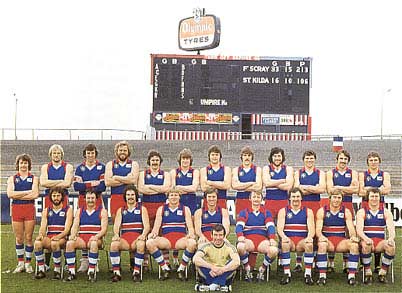
Here are the men who brought Footscray the competition’s then highest ever score.
From the back row standing
Michael Kelly, Bruce Reid, Kelvin Templeton, Peter Welsh, Ian Low, Glenn Scanlen, Richard Murrie, John Reid, Ian Dunstan, Ross Abbey, Alby Smedts and Doug Hawkins
Front row seated
Gary Wheeler, Bruce Burgoyne,(Assistant coach) Jack Di Natale, Alan Stoneham, Geoff Jennings, Don McKenzie(Coach) Ted Whitten junior, Terry Wheeler, Steve Power,
Centre sitting on grass
Ron Simmons (runner) Absent from photograph is the captain Gary Dempsey
FINAL QUARTER HIGHLIGHTS
Click the images below to view the final quarter highlights.
RETURNING SOON!
 |
 |
 |
 |
 |
 |
 |
 |
 |
 |
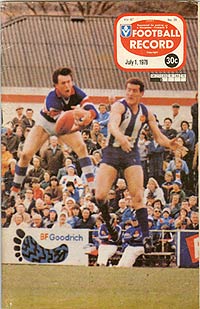
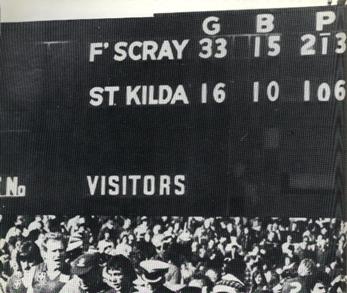
This is the front cover of the Football Record for Saturday 01st July 1978. It shows Kelvin Templeton and North Melbourne’s Ross Glendinning in action from the week before clash between Footscray and our opponent North Melbourne at their then home ground Arden Street. We won this match against the reigning premiers and subsequent Grand Finalists of 1978.
A season earlier I was in attendance for our fixture against Essendon at their then home ground Windy Hill. That match on Saturday 07th May 1977 saw Essendon finish with 13.11.89. Our score? Well it was 29.15.189, which translates to a 100 point victory. My main memory of that game was Templeton being carried off injured, I think at three quarter time and ended his season. Another memory was that some of our players wore different numbers. I think Terry Wheeler, Geoff Jennings, Ted Whitten and one other player swapped numbers. Wheeler may have been wearing 25 and Jennings 35.Possibly our last goal was kicked after the siren to take the margin from 94 points to the magical 100, maybe by Bluey Hampshire. He had some involvement in it I’m sure. I can’t recall it exactly as a seven year old, worse is the fact that the game is rarely mentioned these days and I assume that there are no archival highlights of it kept.
This was our record score in VFL football, yet happily that record was not to last for long. In fact it was less than 14 months, because on Saturday 1st July 1978, the record was broken (see above image).
Here are both the Footscray and St Kilda teams, from that day as recorded from “The Football Record.”
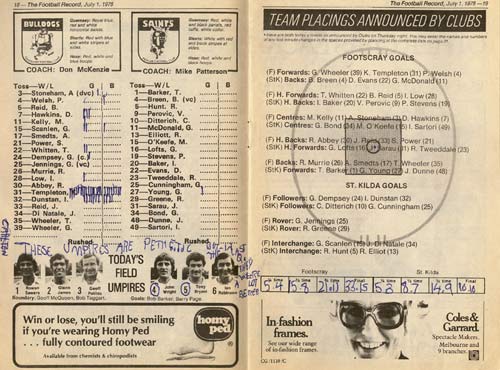
This is the page with the progressive match scores. The scores are from my eight, nearly nine year old right hand.
This is a bit difficult to read, so I hope writing them out makes it a bit easier. Both team’s full lists are a bit further down the page and directly below are the umpires for this momentous day.
The field umpires were to be selected from
| 1 Rowan Sawers | 2 Glenn James | 3 Geoff Polites |
| 4 John Wright | 5 Tony Bryant | 6 Ian Robinson |
and it was numbers four and five, John Wright and Tony Bryant controlling the game.
The Boundary Umpires were Geoff McQueen and Bob Taggart
The Goal Umpires were Bob Barker and Barry Page
THE TEAMS PLACINGS ANNOUNCED BY CLUBS
| (F) Forwards: G.Wheeler(39) K.Templeton(31) P.Welsh(4) |
| (StK) Backs: B.Breen(4) D.Evans(22) G.McDonald(11) |
| (F) H.Forwards: T.Whitten(22) B.Reid(5) I.Low(28) |
| (St K) H.Backs: I.Baker(20) V.Perovic(9) P.Stevens(19) |
| (F) Centres: M.Kelly(11) A.Stoneham(3) D.Hawkins(7) |
| (StK) Centres: G.Bond(34) M.O’Keefe(15) I.Sartori(49) |
| (F) H.Backs: R.Abbey(30) J.Reid(33) S.Power(21) |
| (StK) H.Forwards: G.Lofts(16) J.Sarau(31) R.Tweeddale(23) |
| (F) Backs: R.Murrie(26) A.Smedts(17) T.Wheeler(35) |
| (StK) Forwards: T.Barker(1) G.Young(27) J.Dunne(48) |
| (F) Followers: G.Dempsey (24) I.Dunstan(32) |
| (StK) Followers: C.Ditterich(10) G.Cunningham(25) |
| (F) Rover: G.Jennings(25) |
| (StK) Rover: R.Greene(29) |
| (F) Interchange: G.Scanlen(15) J.Di Natale(34) |
| (StK) Interchange: R.Hunt(5) R.Elliott(13) |
| Footscray: | 5.4. (34) | 15.8 (98) | 21.11(137) | 33.15(213) |
| St Kilda: | 5.3. (33) | 8.7 (55) | 14.9 (93) | 16.10(106) |
This is the page with the progressive match scores.
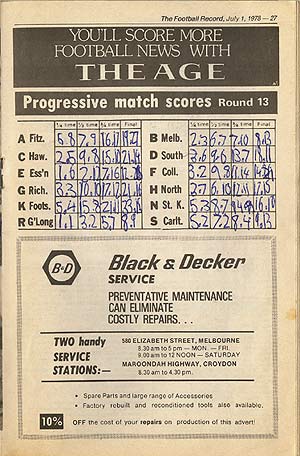
Notice the top fixture for this Round 13 Saturday July 01st 1978 was the Waverley clash between Fitzroy and Melbourne. An easy victory for the Roys and an ominous rehearsal for the occurrence one season later when these teams met again at Waverley. The 1979 clash was also one sided, an annihilation nothing less. Disastrous for Melbourne but also, Fitzroy were to take the VFL highest score record away from us. Carlton’s 30.30.210 against Hawthorn in April 1969 was held for 9 years. We broke it but our custody of this cherished accomplishment was to last less than 13 months.
The next item below is the senior and reserve lists for both Footscray and St Kilda as at 01 st July 1978.

If these names are a bit difficult to read, then I hope this makes it a bit easier.
FOOTSCRAY
Senior Coach: Don McKenzie
Reserves Coach: Bruce Burgoyne
Under 19’s Coach: Gerald Ryan
TODAY’S SENIOR TEAM
| 3 | Alan Stoneham |
| 4 | Peter Welsh |
| 5 | Bruce Reid |
| 7 | Doug Hawkins |
| 11 | Michael Kelly |
| 15 | Glenn Scanlen |
| 17 | Albert Smedts |
| 21 | Stephen Power |
| 22 | Ted Whitten |
| 24 | Gary Dempsey |
| 25 | Geoff Jennings |
| 26 | Richard Murrie |
| 28 | Ian Low |
| 30 | Ross Abbey |
| 31 | Kelvin Templeton |
| 32 | Ian Dunstan |
| 33 | John Reid |
| 34 | Jack Di Natale |
| 35 | Terry Wheeler |
| 39 | Gary Wheeler |
RESERVE GRADE TEAM FROM
| 1 | Ian Hampshire |
| 6 | Paul Wharton |
| 8 | Ian Morrison |
| 9 | Wayne Fox |
| 10 | Peter Munro |
| 12 | George Brown |
| 13 | Lindsay Barwick |
| 14 | Robert Gronewegen |
| 16 | Dennis Blair |
| 18 | Phil Bradmore |
| 19 | Gordon Polson |
| 20 | Jim Edmond |
| 23 | Lee Perussich |
| 27 | Jeff Gieschen |
| 29 | Neil Cordy |
| 36 | Neil Hodder |
| 37 | Tony Fox |
| 38 | Neil Wright |
| 40 | Brian Wilson |
| 41 | Matt Johnson |
| 42 | Wayne Foreman |
| 43 | Norman Tivendale |
| 44 | Graeme Linke |
| 45 | Don Henwood |
| 46 | Greg Davis |
| 47 | Mark Bass |
| 48 | Angy Tantsis |
| 49 | Michael Egan |
| 50 | Scott Taylor |
ST KILDA
Senior Coach: Mike Patterson
Reserves Coach: John Northey
Under 19’s Coach: Bob Murray
TODAY’S SENIOR TEAM
| 1 | Trevor Barker |
| 4 | Barry Breen (Vice Captain) |
| 5 | Rex Hunt |
| 9 | Val Perovic |
| 10 | Carl Ditterich |
| 11 | Gary McDonald |
| 13 | Robert Elliott |
| 15 | Maurice O’Keefe |
| 16 | Gary Lofts |
| 19 | Phil Stevens |
| 20 | Ian Baker |
| 22 | Dale Evans |
| 23 | Russell Tweeddale |
| 25 | Geoff Cunningham |
| 27 | George Young |
| 29 | Russell Grene |
| 31 | Jeffrey Sarau |
| 34 | Graeme Bond |
| 48 | Jeff Dunne |
| 49 | Ian Sartori |
RESERVE GRADE TEAM FROM
| 2 | Garry Sidebottom |
| 3 | Bruce Duperouzel |
| 6 | Mark Greene |
| 7 | Greg Lane |
| 8 | Glenn Elliott |
| 12 | Garry Colling (Captain) |
| 14 | Jim O’Dea |
| 17 | Mordy Bromberg |
| 21 | Don Discher |
| 24 | Graeme Gellie |
| 26 | Colin Carter |
| 28 | Richard Fish |
| 30 | Gary Becker |
| 32 | Robert Muir |
| 33 | Gerard Cahir |
| 35 | Paul Callery |
| 36 | Jim Hickman |
| 37 | Mark Sarau |
| 38 | Douglas Booth |
| 39 | Bill Mildenhall |
| 40 | Chris Stone |
| 41 | Andy Matheson |
| 42 | Shane Gains |
| 43 | Michael Roberts |
| 44 | Craig Williams |
| 45 | Grant Thomas |
| 46 | Stephen Tickell |
| 47 | Rod Butterss |
| 50 | Mark Kellett |
Reserve Grade Field Umpires:
Gary Crisp & Graeme Williams
The players’ names here have been changed so their surname is last rather than the first.
For our opponents St Kilda 1978 was a whirlwind, roller coaster season. At Moorabbin in round 2 they triumphed over us by 7 points in Don McKenzie’s first game as Footscray coach. Against Melbourne at the MCG in Round 6 the Saints booted 31 goals for the afternoon. Seven days later they beat Essendon at Moorabbin in another noteworthy encounter remembered for the Bombers president Colin Stubbs describing St Kilda players as ‘Animals’.
On July 08th one week after our record score performance, the Saints played another away game, at Arden Street and surprisingly beat the reigning premiers. North Melbourne defeated after the siren from a disputed goal from Robert Elliott. They went into the last round with the possibility of making the finals for the first time since 1973. St Kilda fulfilled their side of the task by defeating Carlton but Fitzroy were unable to beat Geelong so it was the Cats who made the 1978 finals rather that the Saints.
On the opening round of 1979 St Kilda accounted for the 1978 premiers Hawthorn at Moorabbin. They were not to defeat the Hawks again till 1990. The 1980’s were to be a trying decade for the Saints and their fans and the narrow finals miss of 1978 would prove harder to take as time went by. This was because it was 1991 before they were to play in the finals again.




